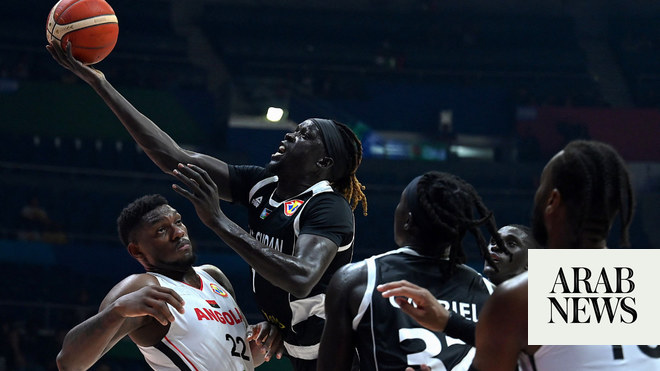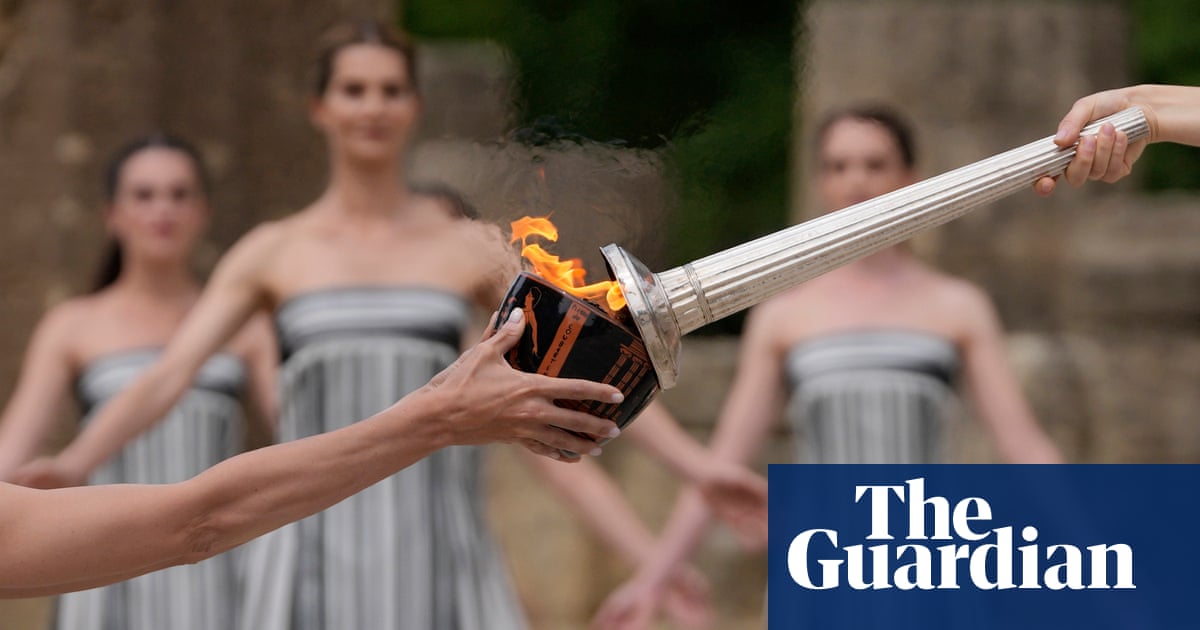
Ahuge cheer erupts as South Sudan pull ahead for the first time against Great Britain, just before half-time. Spectators dressed in black and white T-shirts jump to their feet, waving flags and dancing in the stands of the Copper Box arena in London.
Last Thursday’s basketball match was one of the final warmup games South Sudan will play before the team starts its bid for Olympic gold in Paris on Sunday.
South Sudan, ranked 33rd in the world, is one of two African nations to qualify for basketball at the Olympic Games – the other is Nigeria in the women’s competition. It is a remarkable achievement for the world’s youngest country, which gained its independence in 2011, after years of civil war, and is still racked by conflict, hunger and poverty.
Santina Deng, 63, who has travelled from Birmingham to watch the match, is on her feet and smiling. She came to the UK in 1985, due to civil war in Sudan. “It is a big thing that we are going to the Olympics,” she says.
“It is morale-boosting. The country is still going through difficulties and this is bringing us together.”
The team, nicknamed the Bright Stars, was established in 2011 but its ascent on the world stage began in 2019 when the former NBA All-Star Luol Deng, who represented Great Britain in the Olympics in 2012, became president of the South Sudan Basketball Federation.
Deng, who left Sudan with his family in 1990, aged five, grew up in Egypt and then London, before going to the US to pursue a career in basketball. He has been instrumental in putting the team together, including persuading players and the head coach, Royal Ivey, an American former NBA player, to come on board.
South Sudan has some of the tallest people in the world, a huge advantage for basketball, says Deng. However, it lacks resources, and has no indoor basketball courts. The team has been filled with players who left the country as children or who were born as refugees.
One player, 17-year-old 2.18-metre (7ft 2in) Khaman Maluach, whose family left Sudan for Uganda, first attended a basketball camp run by Deng in the east African country when he was 13.
In April 2021, he won a full scholarship to attend NBA Academy Africa, an elite basketball training centre in Senegal. In the autumn, he will attend Duke University in the US, and is tipped to be a big star.
“The first time I went back home [after a tournament], and seeing a lot of people in one place, the fanbase and people enjoying what we were doing was really inspiring,” says Maluach. “It kept me working hard so I can make my people proud back home.”
Deng adds: “For all of us, it’s a journey that’s bigger than basketball. As a young kid myself, in the NBA, I knew that a lot of young South Sudanese kids and refugees around the world were following my story. Now, it’s even more incredible when you’re doing it as a group.
“What we’re accomplishing for the continent of Africa is a huge thing; sports can elevate and motivate a whole nation.”
The team’s path to qualifying for the Olympics was rocky. In 2020, players tested positive for Covid-19 in advance of one of the African qualifying tournaments, forcing them to withdraw. They were granted a spot in another tournament, when Algeria pulled out, and made it to the World Cup. There, the team beat Angola, 11-time African champions, to become the lowest-ranked team to qualify for an Olympics since 2004.
“The reaction has been amazing,” says Deng. “Not just everyone in the country but the continent – all our diaspora and the refugees have been motivated to see the positive direction.”
Back at the arena in London, Great Britain, which did not qualify for Paris, make a comeback. The game goes down to the last play, with South Sudan successfully defending Great Britain’s final attack to win 84-81.
Chris Grant, chair of the British Basketball Federation, was at the match. He calls South Sudan’s trajectory “astonishing” and one that could help transform the success of the sport in Africa.
He says: “I’m equally interested in the shift of power off the court. Emerging nations, and the infrastructure they’re building around the sport, the way they’re changing their governance and getting involved, will be welcome for world basketball because it helps diversity in the leadership, which needs to reflect the diversity on the court.”
A couple of days later, South Sudan took on the US, reigning Olympic champions and 16-time gold medal winners, who had to fight their way back from 16 points down to pull off a dramatic 101-100 victory and avoid one of the biggest shocks in basketball history.
The teams meet again in the Olympic group stages on Wednesday.
In an interview after the match, the South Sudanese player Wenyen Gabriel, who formerly played for the Los Angeles Lakers, says: “A lot of people around the world don’t know what South Sudan is.
“We’re a bunch of refugees that came together for a few weeks trying our best, playing against some of the best players ever,” he says, adding: “Hoops in Africa is something in the future. It’s only a matter of time before the next generation gets built up.”











